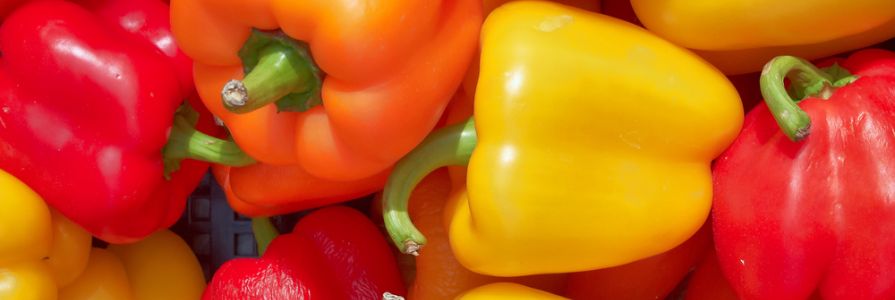There’s an important connection between what you eat and how you look. Learn which foods help you look your best.
A balanced diet is an essential prescription for healthy and vibrant skin. The good news is that the foods that happen to be good for your skin are also good for your overall health.
Many people find that the appearance of aging skin — wrinkles, thickening, discoloration, and decreased elasticity — is one of their biggest beauty concerns. While genetics largely determines when your skin starts to show these signs of aging, and the extent to which it shows them, environmental damage to your skin, as well as damage you cause yourself through lifestyle choices, can greatly accelerate this process.
Skin damage occurs as a result of oxidation, a chemical process in which unstable molecules called free radicals steal electrons from healthy cells. The most damaging oxidative stressors that we expose ourselves to are smoking and sunlight.
Today Show Video: Joy Bauer Talks About Skin and Nutrition
Aside from staying away from cigarettes and using sunscreen when you go out, the next best thing you can do for your skin’s health is to eat a diet rich in antioxidants. These are nutrients that work to defend your body’s cells — including skin cells — against the damage of oxidative stress. You’re probably familiar with some antioxidants, such as vitamin C, vitamin E, selenium, and vitamin A (in the form of beta-carotene). Others, which you may be less familiar with, are collectively known as phytochemicals (there are hundreds of them), and they are found in foods such as fruits, vegetables, nuts, seeds, and beans.
To keep your skin well-protected and nourished, and to extend its youthful appearance, focus on the foods that are good sources of the following nutrients:
Vitamin C
Vitamin C is involved in the production of collagen (which keeps skin firm) and protects cells from damage caused by free radicals. Scientific studies have found that when lab animals eat vitamin C — fortified food, their skin is better able to fight oxidative damage. It’s important, then, to replenish your skin’s vitamin C stores every day by eating plenty of fruits and vegetables. Good sources include bell peppers (red, green, and yellow), broccoli, cantaloupe, mangoes, oranges, pineapple, snow peas, strawberries, tomatoes, and watermelon.
Vitamin E
Vitamin E helps protect cell membranes and guards your skin against damage from the sun’s UV radiation. Some research has suggested that vitamin E may work in combination with vitamin C to provide an extra degree of anti-aging skin protection. However, because recent studies have raised some questions about the safety of vitamin E supplements, this nutrient should come from your diet, not from high-dose pills. It’s best to stick with food sources like wheat germ, fortified whole-grain cereals, nuts and seeds, olive oil, Swiss chard, and spinach, as well as the small amount of vitamin E found in a multivitamin.
Beta-carotene
Beta-carotene, another antioxidant that’s critical for skin health, is converted to vitamin A in the body and is involved in the growth and repair of body tissues. It may also protect your skin against sun damage. In extremely high doses, however, pure vitamin A from supplements can be toxic, so be sure to avoid them unless a doctor has recommended them and is closely supervising you. Beta-carotene from foods like apricots, cantaloupe, carrots, red bell peppers, mangoes, pumpkin, and sweet potato is sufficient and entirely safe for your skin.
Selenium
Selenium is an antioxidant mineral that helps protect the skin from sun damage; it also helps the skin maintain firmness and elasticity. Selenium obtained from food has been shown to reduce sun damage and even prevent some skin cancers in animals. Be sure to avoid selenium supplements, however. The Nutritional Prevention of Cancer Trial found that people with a high risk of nonmelanoma skin cancers who took selenium supplements actually had a 25 percent increased risk of squamous cell carcinomas. The best food sources for selenium are Brazil nuts (no more than 1 or 2 nuts a day because the selenium is so concentrated), tuna (canned, light), crab, oysters, whole-wheat pasta, lean beef, shrimp, whole-wheat bread, turkey, wheat germ, chicken breast, mushrooms, and eggs.
Omega–3 Fatty Acids
Although not classified as antioxidants, omega–3 fatty acids help maintain cell membranes so that they are effective barriers — allowing water and nutrients in but keeping toxins out. These healthy fats also reduce inflammation throughout the body, which may translate into fewer skin breakouts. Omega-3s also seem to offer the skin protection against sun damage. In a study of skin cancer, people who ate diets rich in fish oils and other omega-3 fats had a 29 percent lower risk of squamous cell skin cancer than those who got very little omega-3 fats from food. Good food sources include wild salmon, herring, mackerel (but not king), sardines, anchovies, flaxseed, walnuts, and soybeans. Read more about Omega-3 Fatty Acids
This smoothie makes a perfect breakfast!
Joy’s Beauty Blend
Try this smoothie for a big blast of complexion-friendly nutrients – vitamins C and E, beta-carotene, and omega-3 fats.
Serves 2
Ingredients:
2 cold oranges, peeled and cut into sections
1/2 chopped mango, chilled
1/2 cup sliced frozen (unsweetened) strawberries
1 medium carrot, peeled and shredded
1/2 cup plain, nonfat yogurt, chilled
2 tablespoons wheat germ
2 tablespoons ground flaxseed
1 tablespoon fresh lemon juice
1 tablespoon granulated sugar
Place all ingredients in a blender or food processor and blend until smooth.
Yields 2 1/4 cups
Nutrient Analysis (one serving)
Calories: 250
Protein: 9 g
Carbohydrates: 48 g
Total fat: 4 g
Saturated fat: 0 g
Cholesterol: 0 mg
Sodium: 72 mg
Fiber: 9 g
Vitamin C: 126 mg (209% DV)
Vitamin A (all from beta-carotene): 5,839 IU (117% DV)
Vitamin E: 3.9 IU (13% DV)
+ Omega-3 fats
Learn more about Food Cures for Healthy Living.
Discover more Food Cures for your health.






